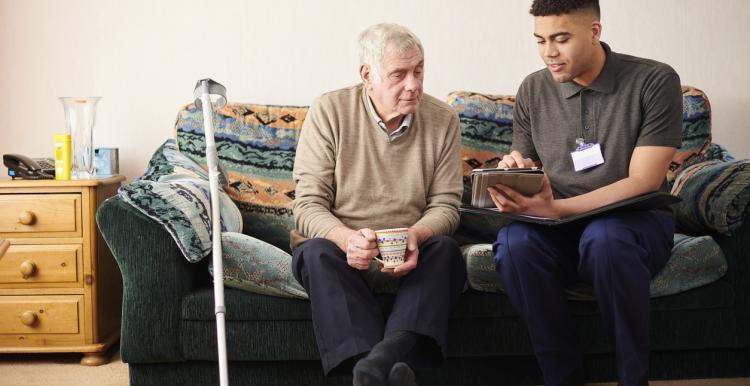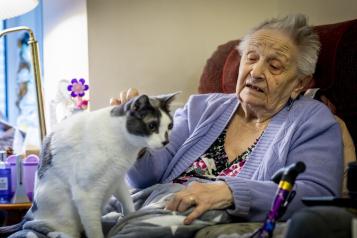What is adult social care?

Social care can be very different from the health care you receive from the NHS. Although it can include medical help, social care offers more practical support to enable people to live independently. These services are usually provided in people's homes, care homes or elsewhere in the community, rather than at a GP practice or hospital.
If you or someone you live needs social care, it's important to understand what types of care and support are available, where to find the correct information, and how services are paid for.
How do I receive help through social care?
The first step is to speak to your local authority's adult social services department and request an assessment.
If you need social care for yourself, this is called a 'care assessment', a 'customer assessment' or a 'needs assessment'.
If you provide unpaid care for someone else, your assessment is called a 'carers assessment'. Carers UK has developed some key tips on requesting an assessment for the first time.
Alternatively, you may be offered a care assessment at home after being discharged from the hospital, called a 'discharge to assess' or a 'home first' approach.
The NHS can also assess people with very complex and long-term health needs for social care support, known as 'NHS Continuing Healthcare' or 'NHS CHC', and involves a separate assessment process from the needs assessments carried out by local authorities.
Who can access adult social care support?
There is no charge for a social care assessment. All adults over 18 are entitled to an assessment to determine whether they could qualify for help or support. Adults can require care due to illness, disability, old age or poverty.
Sometimes, the adults who require support don't pay for help from their council as family or friends support them instead. The loved ones helping in these cases are 'informal carers' or 'unpaid carers'. If this describes you, you could be entitled to support for your mental health, finances, care training or finding others to take over caring responsibilities while you take a break.
If you are eligible for social care support following an assessment, you can speak with your council to agree on your social care support details. These details are your 'support plan', 'care plan' or 'care package'.
How do I pay for social care?
Another assessment called a 'financial assessment' or 'means test' will determine whether you qualify for free social care or whether you need to contribute towards the cost of your care plan.
The criteria used in means tests are quite complicated and involve the local authority looking at your financial assets, which can mean your earnings, savings or investments you've made or any benefits you receive (including your pension). If you plan on receiving care at home, the council will not include the cost of your home under your assets.
If you plan to receive support in a residential care home, the council will include the cost of your home as part of your assets.
The means test thresholds are:
- If you have assets below £14,250, the local authority will pay for your care in full.
- The local authority will partially pay for your care if you have assets between £14,250 and £23,250.
The local authority will provide you with a 'personal budget' if you are eligible for financial support, which you can spend on local services. This is money you are entitled to, so you can ask the council to either:
- Manage your personal budget for you and arrange for services based on your care plan.
- Pay the money to a care organisation of your choice to arrange for services based on your care plan.
- Pay the money directly to you to arrange for care services yourself – this is known as 'direct payments'.
As mentioned, some people can also qualify for free social care through NHS continuing healthcare. However, if your assessment finds you are not eligible, you might be eligible instead for 'NHS-funded nursing care', where the NHS will contribute to the cost of your nursing care, for example, in a care home.
The organisation Beacon provides free independent advice on NHS continuing healthcare.
Unpaid carers do not have to contribute towards the support services they access following an assessment.
Social care reform
In a statement to the House of Commons on 7 September 2021, the Prime Minister announced plans to increase health and social care funding through the 'Health and Social Care Levy'.
This announcement also included a plan to introduce a new £86,000 cap on care costs, meaning that from October 2023, nobody should spend more than £86,000 on personal care over their lifetime. It is important to note that people's daily living costs living in a residential care home won't count towards the cap.
The thresholds for financial support will also change
- People with assets below £20,000 will be eligible for free care.
- People with assets between £20,000 and £100,000 will have to contribute towards their care on a sliding scale. Once these people reach the £86,000 cap, they will no longer need to pay for their personal care costs, though there may still be charges for other types of care or accommodation.
- People with assets over £100,000 will have to pay for their care in full. Once these people reach the £86,000 cap, they will no longer need to pay for their personal care costs, though there may still be charges for other types of care or accommodation.
What type of support is available through social care?
Your local authority is responsible for managing social care services in your area. Councils may provide some services themselves, or they may buy services from care providers to meet the needs of their residents.
Local services can include:
- Support to enable people to develop the skills needed to live independently. Sometimes these services are referred to as 'reablement services' or 'short-term support'. They can involve help with doing certain activities again after illness or injury.
- Support with getting up in the morning, washing, dressing, and using the toilet. These services are referred to as 'personal care'.
- Help with household tasks, such as cleaning, cooking and eating meals or shopping.
- Support with organising physical, leisure or social activities. These services are called 'day care services' or 'day care opportunities'. They involve meals, refreshments, help with health issues or just an opportunity to meet and speak to others.
- 'Respite care', where you might have your care needs met by different carers or in a different location for a few hours, an overnight stay, or even longer. Respite care services can provide an opportunity for carers to take a break from caring.
- Support finding housing for people affected by homelessness who have care needs following a needs assessment.
The local council can offer social care services in different settings too:
- At home – often called 'domiciliary care' or 'home care', this is where your care plan needs, including personal care and short-term care, are provided in your own home. Sometimes you might need adaptations made in your home to help with living there independently, such as installing a stairlift, fitting a shower rail or adding a ramp to your property.
- In a care home or nursing home – often called 'residential care', this is where your care plan needs, including personal care, reablement and any health care needs, are provided in the care home where you live.
- In a specialist home – instead of a home care team coming to your house to provide support, you might live in a home where care and support are offered on-site. These homes include 'sheltered housing', 'supported living', 'assisted living', 'shared lives schemes' and 'extra care housing'.
- In a daycare setting – the local council can provide daycare opportunities in a range of locations in the community, including daycare centres, sports centres, cafes, restaurants, or outdoor spaces.
Where can I find more information about social care?
All local authorities must have information and advice services relating to care and support so you can make well-informed choices and plans for your social care needs. Find out more information on your local authority's website.
Information and advice services will provide more information on:
- Assessments and eligibility
- Personal budgets
- Choosing the right care option
- Safeguarding
- Independent advocacy
Speak to us
We're here to listen to the issues that really matter to local communities and hear about your experiences of using health and social care services. We can also provide advice and information about health and social services and support.
You can also find more advice on social care here:

